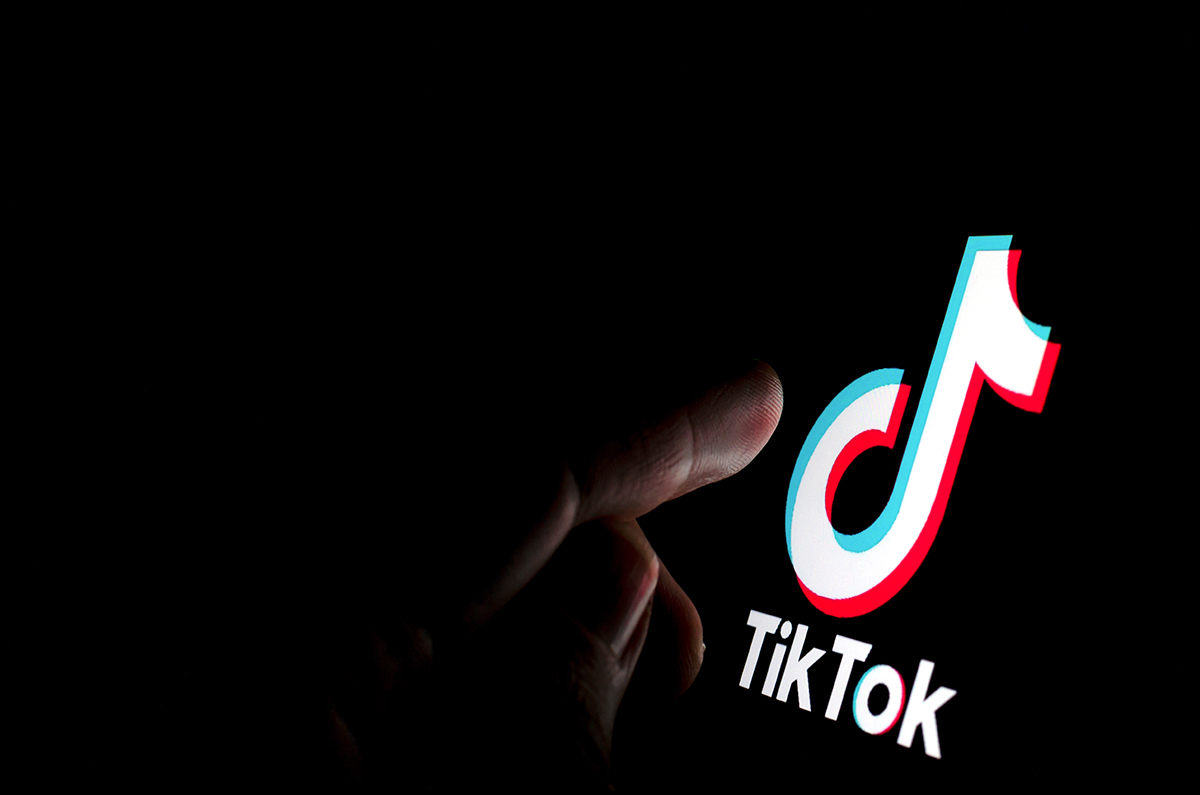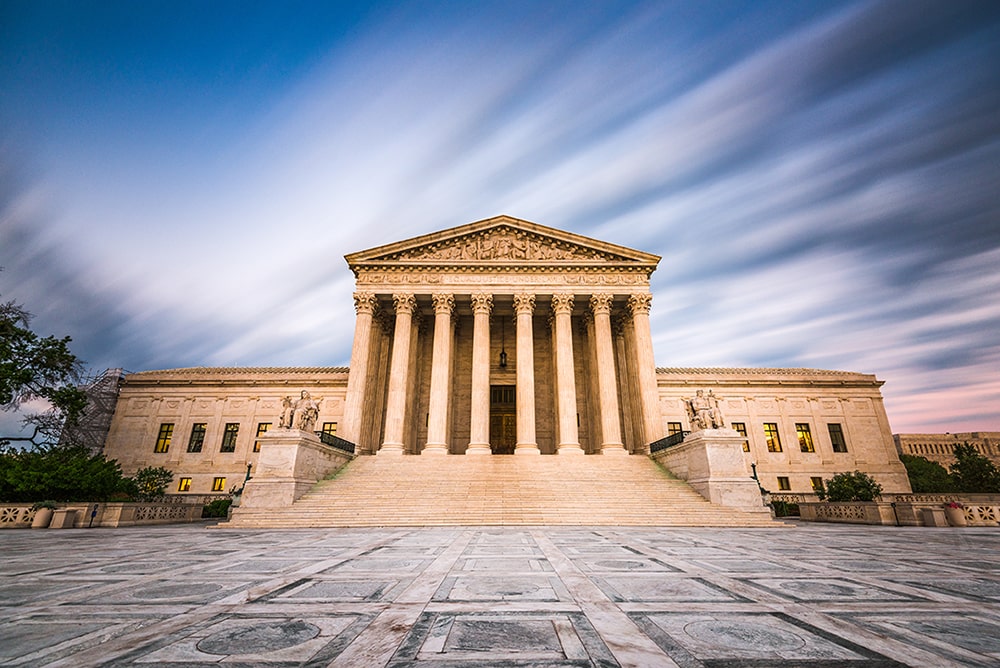

Banning TikTok: Turning point for U.S. data security or threat to free speech?
In a move that has people talking about national security, free speech, and digital innovation, the United States government is poised to issue a ban on TikTok, one of the most popular social media platforms in the world.
Sarah Filipiak BSJ '01, BS '23 | January 16, 2025
Share:
Concerns about the Chinese government’s influence over ByteDance—TikTok’s parent company—and the platform’s data practices have driven congressional action and widespread media coverage in the past year. According to a recent Supreme Court filing (PDF), TikTok’s audience includes more than 170 million monthly users in the U.S., making the implications of a ban far-reaching.
Lawmakers issued a Jan. 19 deadline for ByteDance to sell the U.S. assets of TikTok, citing fears that China could gain access to U.S. user data. The deadline was set in April 2024, when Congress passed the Protecting Americans from Foreign Adversary Controlled Applications Act, signed into law by President Joe Biden.
TikTok and ByteDance have maintained no U.S. user data has or would be shared, and say a ban violates the Constitution's First Amendment protection against government restriction of free speech. Recent news from Reuters suggests TikTok plans to preemptively shut down operations in the U.S. if the ban is enacted. The U.S. Supreme Court on Friday unanimously decided to uphold the ban but Biden administration officials confirmed Thursday the President won't enforce the ban, according to the Associated Press. Forbes reports that President-Elect Trump, set to take office on Jan. 20, is also considering an executive order to delay the ban.
Ohio University experts in cybersecurity, international strategy, and media law weigh in on the complex issues at play, and explore the privacy and security risks, geopolitical tensions, free speech concerns and future of social platforms in light of the proposed ban.

The TikTok ban and U.S. national security concerns
The U.S. government's main argument for the proposed TikTok ban is national security. A brief from the Center for Strategic & International Studies in October 2024 highlights concerns about the Chinese Communist Party potentially influencing TikTok’s users by controlling user feeds, suppressing dissent, or spreading disinformation. While TikTok’s data collection practices—including collecting personal information, browsing history, and location data—aren't new territory for social media platforms, in this case officials are concerned about the potential for misuse by foreign actors.
Chad Mourning, assistant professor of Computer Science in the Russ College of Engineering and Technology, says that while banning TikTok might feel like a tidy solution, it doesn't eliminate the risks associated with data privacy and national security.
“To paraphrase Ian Malcolm, social media will find a way,” he says. “In fact, the recent anti-trust decisions requiring companies to allow multiple app stores will likely lead to people illegally distributing the TikTok app and updates.”
He compared it to previous efforts to shut down platforms like The Pirate Bay (a well-known website used to share files through peer-to-peer networks), suggesting that even if TikTok is banned, users would find ways to bypass the restrictions. This, he explains, could lead to increased cybersecurity risks, as users might inadvertently expose themselves to malicious apps.
“Brand-new themes of cybersecurity scams are going to pop up promising people illicit access to TikTok and they will end up with compromised devices,” he says, noting that untrustworthy apps can harbor malware in the same way a pirated streaming session might.
Examining the U.S.-China rivalry in the digital age
The TikTok ban is not occurring in a vacuum but against the backdrop of continuing U.S.-China tensions. As J. Michael Geringer, an international strategy expert and O’Bleness Professor of International Strategy in the College of Business explains, China has a history of banning or regulating U.S. tech companies like Meta and Google. He notes the U.S. government’s actions could be seen as a reciprocal move in this ongoing geopolitical rivalry.
“From the standpoint of the U.S. threatening the same thing, that ‘If you aren’t abiding by our concerns, then we are going to impose these constraints’—that's not unique,” he says. “So, I think from that standpoint, there is precedent for it…. Will it help relations between the countries? Certainly not.”
Geringer notes that the TikTok ban fits into a broader pattern of geopolitical competition and suggests that the ban could lead to diplomatic tensions with China and might prompt some form of retaliatory response.
“Is it something that's going to cause World War III? I don't believe so,” he says, suggesting the target might be a corporation like “Apple, or limiting one of the other [U.S.] companies on what they can do if they're collecting information or operating in China.”
Geringer concurred with Mourning’s assessment that whether TikTok becomes unavailable or merely less stable thanks to a ban, users will seek other platforms.
“People are still going to demand social media. They're going to demand content. And [users] are going to go somewhere,” he says.
Amid this week’s uncertainty around a Supreme Court decision, millions of TikTok users have started migrating to Rednote (Xiaohongshu), another Chinese-owned platform, raising further questions about whether a ban would truly mitigate risks. Geringer notes the impacts of a TikTok ban on U.S. market share might create a ripple effect on retaliation in other sectors, as well.
“China is one of the top economies of the world. This [market share] is important whether it's going to be in social media or in other sectors. You know, smartphones, chips, computers, whatever—it's going to be about whether you're missing out on this very large market. That could be quite substantial.”

The United States Supreme Court Building in Washington, D.C.
TikTok ban raises free speech, public trust concerns
TikTok has become a major platform for political expression and activism, especially among younger users and marginalized communities. Aimee Edmondson, a media law expert and professor in the Scripps College at Ohio University, suggests that legislative bans like this often feel like quick fixes to legitimate policy concerns, but carry unintended consequences for free expression. Edmondson is using the TikTok ban discussion as a teaching moment in her First Amendment law Honors Tutorial seminar, asking students how their understanding of free speech evolves as they engage with this case in real time.
“First amendment scholars are arguing that [a ban] threatens free expression and access to ideas,” she says. “Montana passed a law in 2023 banning TikTok, with concern over the potential for the Chinese government to access user data. And that law was challenged and the federal judge blocked that ban, ruling that it was unconstitutional. So this topic has been in our court system for a while.”
Edmondson suggests that TikTok provides a space where diverse voices can share ideas and mobilize around important issues. A ban, she warns, could disproportionately affect these communities by limiting use of an established public forum.
“Disenfranchised users, those who are not as politically savvy or don't have deep pockets, could certainly be affected, including the younger crowd” who may not have the political capital to push back effectively, Edmondson explains. “For certain communities, TikTok is the marketplace of ideas or the public sphere—their town hall.”
The ban also raises concerns about public trust in government. Edmondson notes that actions like this potential ban, while framed as protecting national security, can often erode people’s confidence in the government’s commitment to fundamental rights like free speech.
Both Edmondson and Geringer point out that concerns about TikTok’s data practices mirror issues seen with U.S.-based platforms. Edmondson says the failure of privacy laws to address widespread data harvesting and the role of algorithms in amplifying harmful narratives are systemic problems across digital media.
“We need a federal privacy law instead that would limit how companies—all companies—collect, store, analyze, sell our personal data,” Edmondson says. “That could affect this entire data broker industry in a way that would truly be meaningful.”
The future of social media platforms and innovation
If TikTok is banned, what’s next for social? Innovation in the social media space may pick up as competitors and startups try to capture TikTok’s massive user base. Geringer suggests that such disruption could stimulate competition and lead to the emergence of more advanced platforms.
“It's possible that by taking away TikTok, it's going to force all the other competitors and potential entrants to do something new and clever and could actually advance the social media field,” he says.
Geringer also points out that TikTok’s ultimate demise may not be the result of a U.S. ban, but rather time itself. “This is a rapidly changing sector. There are a lot of players that will push or pull for their advantage or their competitor’s disadvantage,” he says, acknowledging that TikTok may become the next generation’s Facebook, becoming less popular in the world of social.
Mourning points out there are risks to data security associated with both legislative reactions and technology’s rapid shifts.
“Some people assume that you have a many-headed Hydra problem where when you kill one platform, two will rise up in its place, but that's not as likely to happen here. Social media needs a critical mass to operate,” he says. “There is an appreciable irony that Rednote is [now] the number one app on the Apple Store, when it's another Chinese company, and number two is Lemon8, also owned by ByteDance; technology is always going to move faster than legislation, and in the zeal for finding a replacement, may give over even more data than before.”

Aimee Edmondson, professor of media law and journalism history.

J. Michael Geringer, O'Bleness professor of international strategy.

Chad Mourning, assistant professor of computer science.
Countering disinformation in the information age
How might a ban affect efforts to counter disinformation? According to a 2024 report from the Carnegie Endowment, counter-disinformation strategies are inherently political, and even the widespread use of a relatively longstanding and trustworthy effort like fact-checking has taken years of study and research to develop. The report describes “immediate and visible actions,” like the TikTok ban, as having “narrow impacts.” Edmondson agrees.
“Legislative bans might feel like quick fixes to legitimate policy concerns and in this context, national security, but bans are so rarely the solution,” she says.
As disinformation tactics evolve, experts argue that a fix lies not in outright bans but in long-term strategies like better federal privacy legislation, as Edmondson suggested, and more digital literacy education. Mourning advises that teaching younger users about data privacy and the potential risks of manipulation could be more effective than outright bans in the long run.
“When I was a kid, there was always a trope about teaching students to rear children by giving them an egg to take care of for a week without getting lost or broken,” he recalls, noting a parallel opportunity for a lesson in data privacy. “Give children a secret token and tell them to make sure no one else knows it, and let the experiment run for a year.”
Geringer concurs that user education on data privacy is key.
“The notion of, ‘Who cares? I'm watching videos of kittens. Why should I be concerned about that?’” he says, suggesting how some users might be less concerned about the potential for data misuse. “The bigger issue is that maybe they're not aware the extent to which they may be manipulated, that the algorithms may be, unbeknownst to them, helping to create misinformation or false perspectives or otherwise manipulating people.”
Mourning also raised concerns about evolving data harvesting techniques, like using stolen facial recognition and voice samples to create digital avatars. He cautioned that with advanced AI, such data could be exploited for manipulation or misinformation if it falls into the wrong hands.
An evolving debate
The global conversation about the TikTok ban highlights views on social media, national security, freedom of speech, and tech companies’ rights and responsibilities. While the outcome remains uncertain, one thing is clear: this legislative debate will have far-reaching implications for how the U.S. navigates foreign-owned technology and moves to protect its citizens’ data.
As this story evolves, future legal or political developments may shift the landscape further. For now, questions remain—can the U.S. ever feel safe with foreign-owned social media platforms, and is a more nuanced approach possible?

